norway 挪威英文简介
- 格式:doc
- 大小:29.50 KB
- 文档页数:3
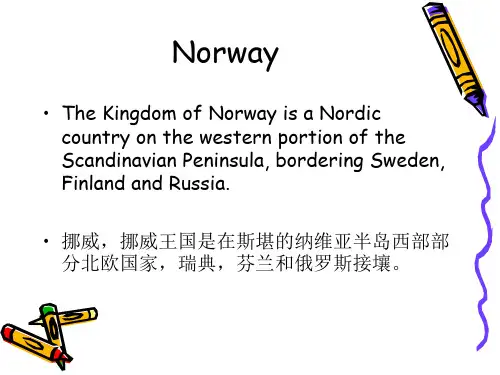
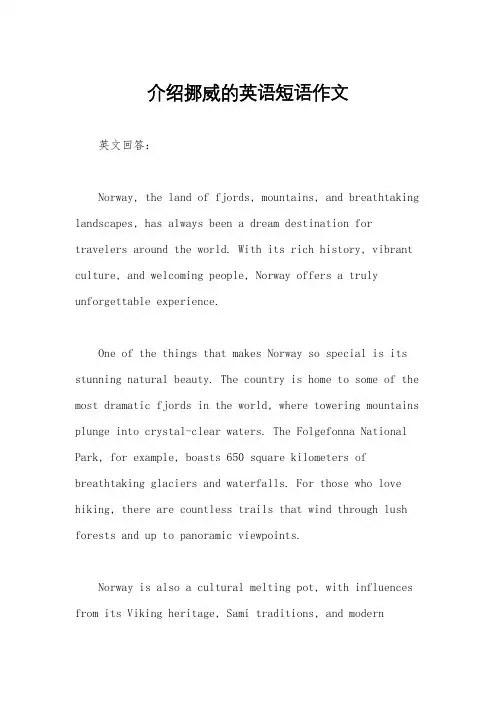
介绍挪威的英语短语作文英文回答:Norway, the land of fjords, mountains, and breathtaking landscapes, has always been a dream destination for travelers around the world. With its rich history, vibrant culture, and welcoming people, Norway offers a truly unforgettable experience.One of the things that makes Norway so special is its stunning natural beauty. The country is home to some of the most dramatic fjords in the world, where towering mountains plunge into crystal-clear waters. The Folgefonna National Park, for example, boasts 650 square kilometers of breathtaking glaciers and waterfalls. For those who love hiking, there are countless trails that wind through lush forests and up to panoramic viewpoints.Norway is also a cultural melting pot, with influences from its Viking heritage, Sami traditions, and modernScandinavian design. Oslo, the capital city, is a vibrant hub of culture and entertainment, with world-class museums, theaters, and nightlife. Be sure to visit the Viking Ship Museum, where you can see some of the best-preserved Viking ships in the world.The Norwegian people are known for their warmth and hospitality. They are proud of their country and eager to share its beauty with visitors. I have had the pleasure of meeting many Norwegians during my travels, and I havealways been impressed by their kindness and generosity.If you are planning a trip to Norway, there are a few things you should keep in mind. First, the weather can be unpredictable, so it is important to pack for all types of conditions. Second, Norway is an expensive country, so itis important to budget accordingly. Third, the people of Norway speak Norwegian, but most of them also speak English.中文回答:挪威是峡湾、山脉和令人叹为观止的风景之地,一直是世界各地旅行者的梦想目的地。
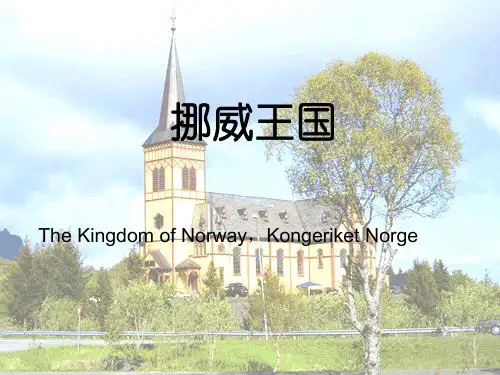
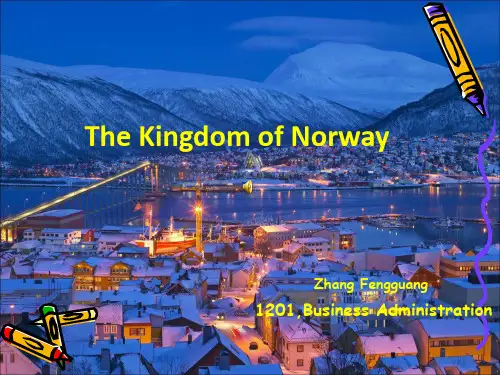
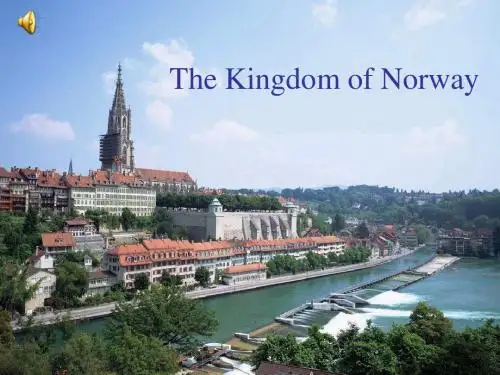

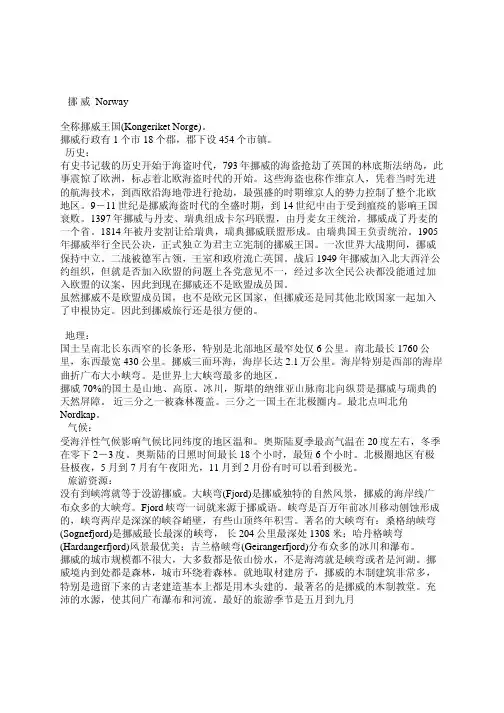
挪威 Norway全称挪威王国(Kongeriket Norge)。
挪威行政有1个市18个郡,郡下设454个市镇。
历史:有史书记载的历史开始于海盗时代,793年挪威的海盗抢劫了英国的林底斯法纳岛,此事震惊了欧洲,标志着北欧海盗时代的开始。
这些海盗也称作维京人,凭着当时先进的航海技术,到西欧沿海地带进行抢劫,最强盛的时期维京人的势力控制了整个北欧地区。
9-11世纪是挪威海盗时代的全盛时期,到14世纪中由于受到瘟疫的影响王国衰败。
1397年挪威与丹麦、瑞典组成卡尔玛联盟,由丹麦女王统治,挪威成了丹麦的一个省。
1814年被丹麦割让给瑞典,瑞典挪威联盟形成。
由瑞典国王负责统治。
1905年挪威举行全民公决,正式独立为君主立宪制的挪威王国。
一次世界大战期间,挪威保持中立。
二战被德军占领,王室和政府流亡英国。
战后1949年挪威加入北大西洋公约组织,但就是否加入欧盟的问题上各党意见不一,经过多次全民公决都没能通过加入欧盟的议案,因此到现在挪威还不是欧盟成员国。
虽然挪威不是欧盟成员国,也不是欧元区国家,但挪威还是同其他北欧国家一起加入了申根协定。
因此到挪威旅行还是很方便的。
地理:国土呈南北长东西窄的长条形,特别是北部地区最窄处仅6公里。
南北最长1760公里,东西最宽430公里。
挪威三面环海,海岸长达2.1万公里。
海岸特别是西部的海岸曲折广布大小峡弯。
是世界上大峡弯最多的地区。
挪威70%的国土是山地、高原、冰川,斯堪的纳维亚山脉南北向纵贯是挪威与瑞典的天然屏障。
近三分之一被森林覆盖。
三分之一国土在北极圈内。
最北点叫北角Nordkap。
气候:受海洋性气候影响气候比同纬度的地区温和。
奥斯陆夏季最高气温在20度左右,冬季在零下2-3度。
奥斯陆的日照时间最长18个小时,最短6个小时。
北极圈地区有极昼极夜,5月到7月有午夜阳光,11月到2月份有时可以看到极光。
旅游资源:没有到峡湾就等于没游挪威。
大峡弯(Fjord)是挪威独特的自然风景,挪威的海岸线广布众多的大峡弯。
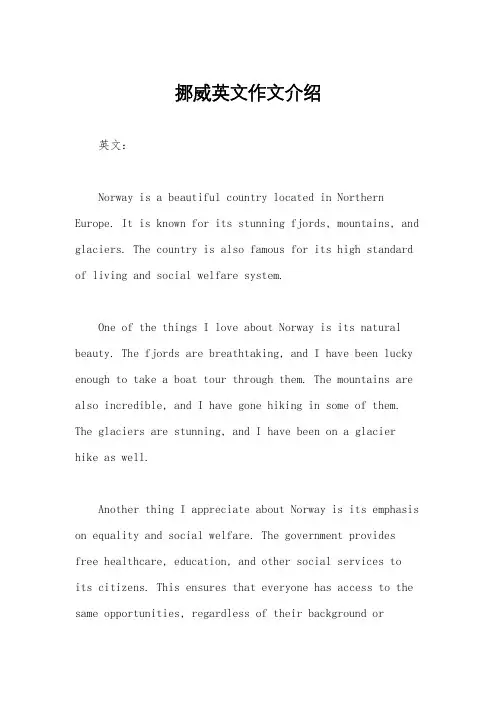
挪威英文作文介绍英文:Norway is a beautiful country located in Northern Europe. It is known for its stunning fjords, mountains, and glaciers. The country is also famous for its high standard of living and social welfare system.One of the things I love about Norway is its natural beauty. The fjords are breathtaking, and I have been lucky enough to take a boat tour through them. The mountains are also incredible, and I have gone hiking in some of them. The glaciers are stunning, and I have been on a glacier hike as well.Another thing I appreciate about Norway is its emphasis on equality and social welfare. The government provides free healthcare, education, and other social services toits citizens. This ensures that everyone has access to the same opportunities, regardless of their background orincome level.In terms of culture, Norway has a rich history and traditions. For example, the country is known for its Viking heritage, and there are many museums and historical sites related to this. The cuisine is also unique, with dishes like lutefisk and rakfisk.Overall, Norway is a wonderful country with a lot to offer. Whether you are interested in nature, culture, or social welfare, there is something for everyone.中文:挪威是位于北欧的美丽国家。
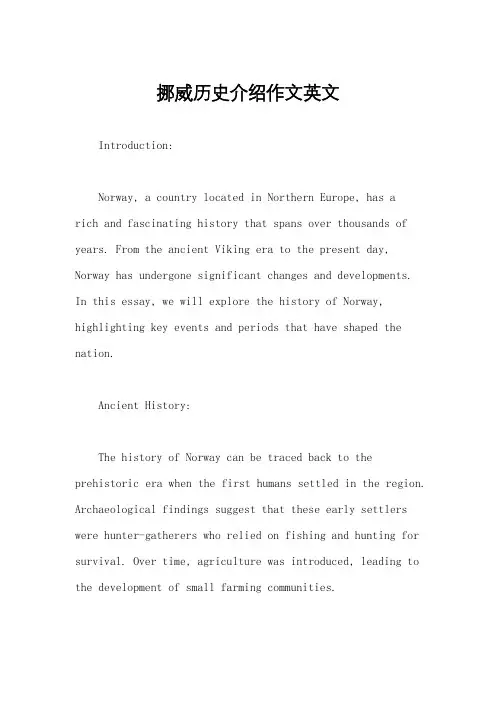
挪威历史介绍作文英文Introduction:Norway, a country located in Northern Europe, has arich and fascinating history that spans over thousands of years. From the ancient Viking era to the present day, Norway has undergone significant changes and developments.In this essay, we will explore the history of Norway, highlighting key events and periods that have shaped the nation.Ancient History:The history of Norway can be traced back to the prehistoric era when the first humans settled in the region. Archaeological findings suggest that these early settlers were hunter-gatherers who relied on fishing and hunting for survival. Over time, agriculture was introduced, leading to the development of small farming communities.Viking Age:One of the most iconic periods in Norwegian history is the Viking Age, which lasted from the 8th to the 11th century. The Vikings, known for their seafaring skills and warrior culture, played a significant role in shaping Norway's history. They explored and colonized various parts of Europe, leaving a lasting impact on the regions they encountered.During this period, Norway was divided into several small kingdoms, each ruled by a local chieftain. However,in the 9th century, Harald Fairhair, a powerful Viking leader, succeeded in unifying Norway into a single kingdom. This marked the beginning of the Norwegian monarchy.Union with Denmark and Sweden:In the following centuries, Norway experienced a series of political changes and alliances. In the 14th century, Norway entered into a union with Denmark, which lasted for more than four centuries. This period, known as the Dano-Norwegian Union, saw Denmark exerting control over Norway's political, economic, and cultural affairs.However, in the early 19th century, Norway sought independence and entered into a union with Sweden in 1814. This union, known as the Union between Sweden and Norway, granted Norway a significant degree of autonomy. Norway retained its own constitution and parliament, but the two countries shared a common king. This union lasted until 1905 when Norway peacefully dissolved the union and declared itself an independent nation.Modern Norway:After gaining independence, Norway underwent rapid industrialization and modernization. The discovery of oil and gas reserves in the North Sea in the late 1960s transformed Norway's economy, making it one of the wealthiest nations in the world.Norway has also played a crucial role in international diplomacy and peacekeeping efforts. It is known for itsactive participation in the United Nations and its efforts to promote peace and human rights globally. Norway has been awarded the Nobel Peace Prize multiple times for its contributions to international peace.Conclusion:From its ancient roots to its present-day prosperity, Norway's history is a testament to the resilience and determination of its people. The Viking Age, the union with Denmark and Sweden, and the modernization of the country have all contributed to shaping Norway into the nation it is today. With a rich cultural heritage and a commitment to global peace, Norway continues to thrive and inspire the world.。
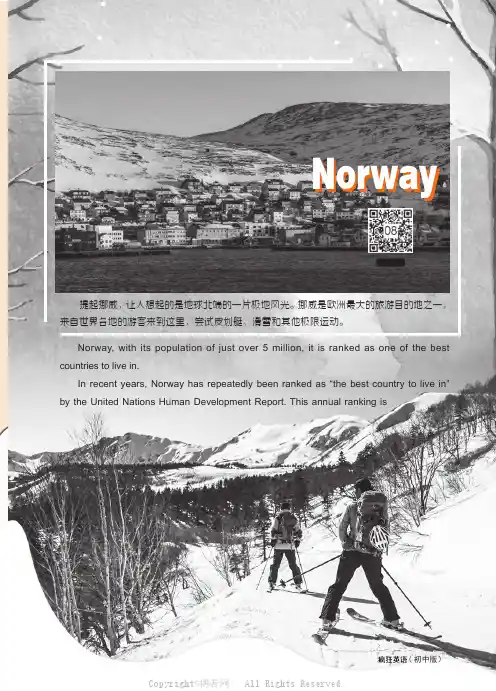
Norway, with its population of just over 5 million, it is ranked as one of the best countries to live in.In recent years, Norway has repeatedly been ranked as “the best country to live in” 提起挪威,让人想起的是地球北端的一片极地风光。
挪威是欧洲最大的旅游目的地之一,来自世界各地的游客来到这里,尝试皮划艇、滑雪和其他极限运动。
Norway挪威Track 8◎本刊编辑部by the United Nations Human Development Report. This annual ranking is/文化万花筒Worldview but also factors such as human rights and cultural freedom. Norway is also rated high for its 1)literacy rate, educational levels and material wealth. In addition, Norway has one of the best welfare systems in the world, making sure that people who are unemployed or unable to work are given support so that they can lead 2)dignified lives. Norway also has one of the lowest crime rates in the world.Norway is a long country located in Northern Europe – with borders to Sweden, Finland and Russia on the east side, and an 3)extensive coastline facing the North Atlantic Ocean on the west side. The major cities in Norway are located along the coastline: the capital Oslo is Norway’s largest city, with about 620,000 inhabitants. Other major cities are Bergen and Stavanger in Western Norway, Trondheim in the middle part and Tromso in the North.Norway occupies the western half of the Scandinavian peninsula. About two-thirds of Norway is mountainous, and off its much-indented coastline lie, carved by deep glacial 4)fjords , some 50,000 islands. A combination of the high altitudes, the northerly location and the moisture from the Atlantic means that most of these islands are covered with permanent ice caps. This was formed by 5)prehistoric glaciers. The area surrounding Voss is a natural starting point for exploring Norway. The mountainous landscape has made it a1) literacy ['lɪtərəsi] n. 读写能力 2) dignified ['dɪɡnɪfaɪd] adj. 庄严的;有尊严的 3) extensive [ɪk'stensɪv] adj. 广泛的;大量的 4) fjord [fjɔ:d] n. (地理)峡湾 5) prehistoric ['pri:hɪ'stɒrɪk] adj. 史前的;陈旧的 6) parachute ['pærəʃu:t] n. 跳伞 popular location for extreme sports, such as BASE jumping.In fact, in Norway, it is nevertheless extreme sports (or adventuroussports) that really stand out. Freeskiing, kiteboarding, downhill andmountain bike racing, rock climbing, rafting,6)parachuting and BASE jumping. The listis almost endless, but one thing is certain:extreme sports are becoming increasingly popular, and are also accessible for the average citizen.A Norwegian proverb claims that “Norwegians are born with skis on their feet”. And Norway is undoubtedly a winter sports nation, with skiing in general and cross-country in particular as the most beloved sport.Every winter hundreds of thousands of Norwegian are stuck in front of the telly, watching the Norwegian cross-country team make a clean sweep in the World Cup – if they are not out skiing themselves. Just how crazy Norwegians are about cross-country skiing is most clearly seen just outside of Oslo, when the race is arranged every winter. The place swarms with Norwegians with and without skis that have come to cheer national and international cross-country stars through the 50-kilometre race.For adventure lovers or holiday seekers, tourists can find whatever kind of experiencethey desire. From the dizzy heights of a cliff, the boundsachieved on the BMX course or the rush from jumping out ofa plane, the varied terrain means there is always somethingfor every tourist all year round.Worldview/文化万花筒参考译文:挪威的人口刚过500万,是世界上最宜居国家之一。
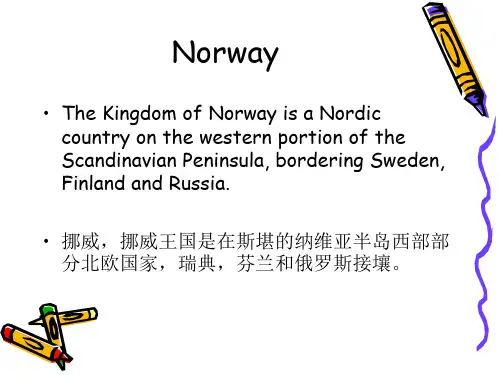
Good morning/afternoon/evening! It is my great honor to stand here today and share with you some insights about the beautiful country of Norway. Norway, a land of fjords, forests, and Northern Lights, has always fascinated me with its unique culture, stunning landscapes, and innovative spirit.Firstly, let's talk about the geography of Norway. Norway is located in Northern Europe, bordering Sweden, Finland, and Russia, with the North Sea and the Atlantic Ocean to the west and the Barents Sea to the north. The country is renowned for its stunning natural landscapes, with over 1,000 islands and a coastline that stretches for more than 20,000 kilometers. Among the most famous natural wonders are the fjords, which are long, narrow inlets of the sea, carved out by glaciers. The most famous fjord is the Geirangerfjord, which was declared a UNESCO World Heritage Site in 2005.Secondly, the people of Norway are known for their friendliness and hospitality. Norwegian culture is deeply rooted in the values of respect, equality, and freedom. The Norwegians have a strong sense of community, and they take great pride in their social welfare system, which provides free healthcare, education, and unemployment benefits. This system is often cited as one of the reasons for Norway's high standard of living.Moreover, Norway is a leader in sustainable development and renewable energy. The country has invested heavily in renewable energy sources, such as hydroelectric power, wind, and solar energy. This has made Norway the world's largest exporter of electricity, with most of its energy exports going to neighboring countries. Norway's commitment to sustainability is not only evident in its energy policy but also in its efforts to combat climate change. The country has been a strong advocate for the Paris Agreement and has set ambitious goals to reduce greenhouse gas emissions.In terms of economy, Norway is one of the wealthiest countries in the world, with a high GDP per capita. The main drivers of the Norwegian economy are oil and gas, which account for a significant portion of the country's exports. However, Norway has been diversifying its economy toreduce its dependence on oil and gas. Other important sectors include seafood, shipping, and tourism.When it comes to education, Norway is known for its high-quality and accessible education system. The country has one of the highest literacy rates in the world, and it is ranked among the top countries in theworld for educational attainment. Norwegian schools are free and compulsory for children aged 6 to 16, and the government invests heavily in research and development to ensure that the country remains competitive in the global market.In conclusion, Norway is a remarkable country with a rich cultural heritage, stunning landscapes, and a strong commitment to sustainability. The people of Norway have a strong sense of community and take great pride in their country's achievements. Norway's success can beattributed to its innovative spirit, focus on education, and dedication to sustainable development.Ladies and gentlemen, let us appreciate the beauty of Norway and learn from its people. Norway's story serves as an inspiration to us all, reminding us of the importance of preserving our natural heritage, promoting social equality, and investing in education and innovation.Thank you for your attention.。
挪威旅行英语作文Norway is a beautiful country located in the northern part of Europe. It is known for its stunning fjords, picturesque landscapes, and rich cultural heritage. I had the opportunity to visit Norway last summer and it was an unforgettable experience.During my trip, I visited the capital city of Oslo. It is a vibrant city with a perfect blend of modern architecture and historical landmarks. One of the highlights of my visit to Oslo was the Vigeland Sculpture Park, which is home to over 200 sculptures created by Gustav Vigeland. The park is a true masterpiece and offers a unique insight into the artist's creativity.After exploring Oslo, I traveled to the western part of Norway to visit the famous fjords. The fjords are natural wonders with steep cliffs, crystal-clear water, and breathtaking views. I took a boat tour to explore the fjords and it was a surreal experience. The sheer beauty and tranquility of the fjords left me in awe.One of the most memorable experiences in Norway was hiking in the mountains. The country is a paradise for hikers with its numerous trails and stunning scenery. I hiked to the famous Pulpit Rock, which offers a panoramic view of the surrounding mountains and fjords. The feeling of standing on top of the world was truly exhilarating.In addition to its natural beauty, Norway has a rich cultural heritage. I had the opportunity to visit the historic Bryggen Wharf in Bergen, which is a UNESCO World Heritage site. The colorful wooden buildings and cobbled streets give the wharf a charming and picturesque atmosphere. I also visited the Viking Ship Museum in Oslo, where I learned about the Viking era and saw well-preserved Viking ships.Norwegian cuisine is also a highlight of the trip. I tried traditional dishes such as fårikål (lamb and cabbage stew) and rakfisk (fermented fish), which are unique to Norwegian cuisine. The fresh seafood, including salmon and cod, was also a delight to indulge in.Overall, my trip to Norway was an incredible experience. The natural beauty, rich culture, and warm hospitality ofthe Norwegian people left a lasting impression on me. I would highly recommend Norway as a travel destination for anyone who wants to immerse themselves in the wonders of nature and history.挪威是一个位于欧洲北部的美丽国家。
挪威历史介绍作文英语Norwegian History Introduction。
Norwegian history is rich and varied, spanning thousands of years from the time of the Vikings to the modern era. This northern European nation has experienced significant developments politically, socially, and culturally, shaping its identity and influencing global events. In this essay, we will delve into the key aspects of Norwegian history, highlighting its major periods, events, and contributions to the world.The Viking Age, which lasted from the late 8th to the mid-11th century, stands out as one of the most iconic periods in Norwegian history. The Vikings were Norse seafarers who explored, raided, and traded across vast territories, leaving a lasting impact on European history. Norway, with its extensive coastline, played a crucial role in Viking expansion. Norwegian Vikings ventured as far as present-day North America, establishing settlements inplaces like Newfoundland, centuries before Columbus's voyage.One of the most significant events in Norwegian history occurred in 872 when Harald Fairhair unified Norway into a single kingdom. This marked the beginning of the Norwegian monarchy and laid the foundation for the nation-state. Throughout the medieval period, Norway's kings consolidated their power, often contending with neighboring kingdoms and engaging in territorial disputes.In 1380, Norway entered into a union with Denmark, a relationship that lasted for over four centuries until 1814. This period, known as the Kalmar Union, saw Norway losing much of its autonomy to the Danish crown. However, it also facilitated cultural exchange and integration between Norway and Denmark, shaping Norwegian society in profound ways.The early 19th century marked a significant turningpoint in Norwegian history with the dissolution of theunion with Denmark and the subsequent union with Sweden.However, Norway's desire for independence persisted, leading to the adoption of a liberal constitution in 1814. Despite initially being forced into a union with Sweden, Norway managed to maintain a degree of autonomy,particularly in domestic affairs.The late 19th and early 20th centuries witnessed a surge in Norwegian nationalism and the emergence of a distinct Norwegian cultural identity. This period also saw the rise of the labor movement, with Norway becoming one of the first countries to grant universal suffrage in 1913. The discovery of oil in the North Sea in the 1960s further bolstered Norway's economy, transforming it into one of the wealthiest nations in the world.Norway's commitment to social welfare, environmental sustainability, and peace diplomacy has earned it international acclaim. The country played a pivotal role in the establishment of the United Nations and has been a staunch advocate for human rights and conflict resolution.In recent decades, Norway has continued to thrive as amodern, progressive society while preserving its rich cultural heritage. Its model of social democracy, characterized by high levels of public spending, universal healthcare, and free education, serves as a benchmark for countries around the world.In conclusion, Norwegian history is a testament to the resilience, ingenuity, and spirit of its people. From the Viking Age to the present day, Norway has navigated through tumultuous periods, overcome challenges, and emerged as a global leader in various fields. Its story is one of exploration, conquest, liberation, and innovation, shaping not only its own destiny but also influencing the course of world history.。
挪威英文作文介绍Norway is a beautiful country located in Northern Europe. It is known for its stunning fjords, picturesque landscapes, and vibrant cities.The capital city of Norway is Oslo, which is a bustling metropolis with a rich history and culture. It is home to many museums, art galleries, and historical sites.Norway is also famous for its outdoor activities, such as hiking, skiing, and fishing. The country's natural beauty and diverse terrain make it a paradise for outdoor enthusiasts.The Norwegian people are known for their friendliness and hospitality. They are also very environmentally conscious and have a deep respect for nature.Norwegian cuisine is delicious and diverse, with a focus on fresh, local ingredients. Some popular dishesinclude smoked salmon, reindeer meat, and traditional pastries.The country has a high standard of living and is known for its strong social welfare system. Education and healthcare are free for all residents, making Norway a great place to live.In conclusion, Norway is a fascinating country with a rich culture, stunning landscapes, and friendly people. It is definitely worth a visit for anyone looking to experience the beauty of Northern Europe.。
挪威英文简介
Norway ,officially the Kingdom of Norway, is a Scandinavian unitary constitutional monarchy whose territory comprises the western portion of the Scandinavian Peninsula, Jan Mayen, the Arctic archipelago of Svalbard and the subantarctic Bouvet Island. Norway has a total area of 385,252 square kilometres (148,747 sq mi) and a population of about 5 million. It is the second least densely populated country in Europe. The country shares a long border with Sweden; it is also bordered by Finland and Russia to the north-east; in its south Norway borders the Skagerrak Strait across from Denmark. The capital city of Norway is Oslo. Norway's extensive coastline, facing the North Atlantic Ocean and the Barents Sea, is home to its famous fjords.
Two centuries of Viking raids tapered off following the adoption of Christianity by King Olav Tryggvason in 994. A period of civil war ended in the 13th century when Norway expanded its control overseas to parts of Britain, Ireland, Iceland, and Greenland. Norwegian territorial power peaked in 1265, but competition from the Hanseatic League and the spread of the Black Death weakened the country. In 1380, Norway was absorbed into a union with Denmark that lasted more than four centuries. In 1814, Norwegians resisted the cession of their country to Sweden and adopted a new constitution. Sweden went to war with Norway but agreed to let Norway keep its constitution in return for accepting the union under
a Swedish king. Rising nationalism throughout the 19th century led to a 1905 referendum granting Norway independence. Although Norway remained neutral in World War I, it suffered heavy losses to its shipping. Norway proclaimed its neutrality at the outset of World War II, but was nonetheless occupied for five years by the Third Reich. In 1949, neutrality was abandoned and Norway became a founding member of NATO. Discovery of oil and gas in adjacent waters in the late 1960s boosted Norway's economic fortunes. In referenda held in 1972 and 1994, Norway rejected joining the European Union. Key domestic issues include immigration and integration of ethnic minorities, maintaining the country's extensive social safety net with an aging population, and preserving economic competitiveness.
Norway is a unitary parliamentary democracy and constitutional monarchy, with King Harald V as its head of state and Jens Stoltenberg as its prime minister. It is a unitary state with administrative subdivisions on two levels known as counties and municipalities. The Sámi people have a certain amount of self-determination and influence over traditional territories through the Sámi Parliament and the Finnmark Act. Although having rejected European Union membership in two referenda, Norway maintains close ties with the union and its member countries, as well as with the United States. Norway participates with United Nations forces in international missions, notably in Afghanistan, Kosovo, Sudan and Libya.
Norway is a founding member of the United Nations, NATO, the Council of Europe, and the Nordic Council; a member of the European Economic Area, the WTO, and the OECD; and is also a part of the Schengen Area.
Norway has extensive reserves of petroleum, natural gas, minerals, lumber, seafood, fresh water, and hydropower. The country has the fourth-highest per capita income in the world. On a per-capita basis, it is the world's largest producer of oil and natural gas outside the Middle East, and the petroleum industry accounts for around a quarter of the country's gross domestic product. The country maintains a Nordic welfare model with universal health care, subsidized higher education, and a comprehensive social security system. From 2001 to 2006, and then again from 2009 through 2011, Norway has had the highest human development index ranking in the world. In 2011, Norway also ranked the highest on the Democracy Index, and according to UNDP Norway is the world's best country.。